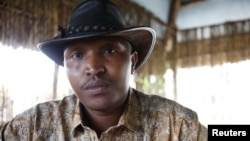NAIROBI, KENYA —
A senior U.S. diplomat has urged Rwanda to allow the transfer of rebel commander Bosco Ntaganda to the International Criminal Court. Ntaganda walked into the U.S. embassy in Kigali earlier this week and asked to be transferred to The Hague, where he is facing charges for war crimes.
In a telephone briefing Wednesday, U.S. Assistant Secretary of State Johnnie Carson called for Rwanda’s “full and complete cooperation” to allow Ntaganda to be transported from the U.S. embassy to the airport as ICC officials arrive in the country.
“Yes, he is in the American embassy. Yes, there are ICC officials en route. But between the embassy and the airport, it is in effect important that his movement, his transport, in no way be inhibited,” said Carson.
U.S. officials have said they had no prior knowledge that Ntaganda had plans to turn himself in until he arrived Monday at the embassy. Now they are trying to determine how to meet his request and to facilitate his transfer to The Hague.
Rwandan officials have said Ntaganda’s transfer is a matter between the U.S. and the ICC, and has nothing to do with Rwanda. But the country’s justice minister has indicated Kigali will allow safe passage.
Carson said U.S. diplomats are in conversations with Rwanda and other international partners on the issue.
“We hope that the Rwandan government will work with the U.S. government, with the Dutch government, and with the appropriate international authorities, the ICC and the U.N., to facilitate the transfer,” said Carson.
While Rwanda has suggested no reason it would hold up the transfer, analysts speculate officials might interfere because of Rwanda's alleged support for the Rwandan-born Ntaganda and his M23 movement, and possibly fears that he could divulge information about that relationship if brought to court.
Rwanda strongly denies supporting the rebels, who defected from the Congolese army last year, and seized territory in eastern Congo.
Ntaganda is facing charges at the ICC of being criminally responsible for war crimes as a commander of rebels in eastern Congo in the early 2000s. The crimes include murder, rape and sexual slavery.
Another former commander from the same rebel group, Thomas Lubanga, already has been tried by the ICC and sentenced to 14 years in prison for crimes relating to the forced conscription of child soldiers - charges Ntaganda also is facing.
In a telephone briefing Wednesday, U.S. Assistant Secretary of State Johnnie Carson called for Rwanda’s “full and complete cooperation” to allow Ntaganda to be transported from the U.S. embassy to the airport as ICC officials arrive in the country.
“Yes, he is in the American embassy. Yes, there are ICC officials en route. But between the embassy and the airport, it is in effect important that his movement, his transport, in no way be inhibited,” said Carson.
U.S. officials have said they had no prior knowledge that Ntaganda had plans to turn himself in until he arrived Monday at the embassy. Now they are trying to determine how to meet his request and to facilitate his transfer to The Hague.
Rwandan officials have said Ntaganda’s transfer is a matter between the U.S. and the ICC, and has nothing to do with Rwanda. But the country’s justice minister has indicated Kigali will allow safe passage.
Carson said U.S. diplomats are in conversations with Rwanda and other international partners on the issue.
“We hope that the Rwandan government will work with the U.S. government, with the Dutch government, and with the appropriate international authorities, the ICC and the U.N., to facilitate the transfer,” said Carson.
While Rwanda has suggested no reason it would hold up the transfer, analysts speculate officials might interfere because of Rwanda's alleged support for the Rwandan-born Ntaganda and his M23 movement, and possibly fears that he could divulge information about that relationship if brought to court.
Rwanda strongly denies supporting the rebels, who defected from the Congolese army last year, and seized territory in eastern Congo.
Ntaganda is facing charges at the ICC of being criminally responsible for war crimes as a commander of rebels in eastern Congo in the early 2000s. The crimes include murder, rape and sexual slavery.
Another former commander from the same rebel group, Thomas Lubanga, already has been tried by the ICC and sentenced to 14 years in prison for crimes relating to the forced conscription of child soldiers - charges Ntaganda also is facing.











